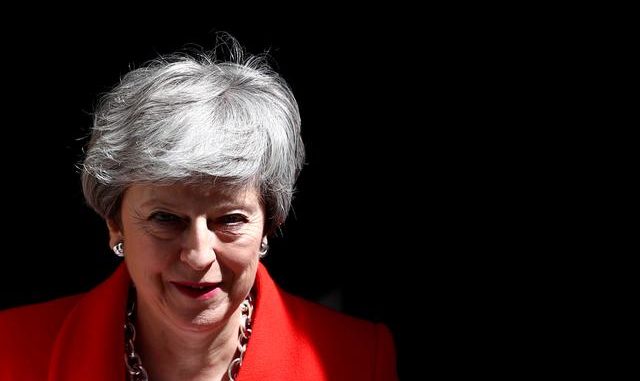
British Prime Minister Theresa May said she will present a “new, bold offer” to lawmakers with “an improved package of measures” in a final attempt to get the Brexit divorce deal through parliament before she leaves office.FILE PHOTO: Britain’s Prime Minister Theresa May is seen outside Downing Street, as uncertainty over Brexit continues, in London, Britain May 15, 2019. REUTERS/Hannah Mckay/File Photo
After failing three times to get parliament’s approval for her deal, the government will now put the Withdrawal Agreement Bill, legislation which will enact that deal, before parliament for a vote in early June.
“Whatever the outcome of any (indicative) votes, I will not be simply asking MPs (lawmakers) to think again. Instead I will ask them to look at a new and improved deal with a fresh pair of eyes – and to give it their support,” May wrote in the Sunday Times newspaper.
The date of the vote and the substance of what lawmakers will be asked to consider – including whether they will be given chance to indicate what preferences might secure a majority before the vote is binding – have yet to be made public.
Brexit talks between May’s Conservatives and the opposition Labour Party collapsed on Friday, hours after May, who sealed the deal with the European Union last year, agreed to set out in early June a timetable for her departure.
The winner of a leadership contest to succeed her will automatically become prime minister and will take control of the Brexit process, which has plunged Britain into its worst political crisis since World War Two.
Facing her last chance to push through the exit from the bloc, which has defined her time in office since the fallout from the referendum in 2016, May said common ground with Labour had been found in workers’ rights and protections, the environment and security.
“When the Withdrawal Agreement Bill comes before MPs, it will represent a new, bold offer to MPs across the House of Commons, with an improved package of measures that I believe can win new support,” she said.
ADVERTISEMENT
WORKERS’ RIGHTS
Labour leader Jeremy Corbyn, however, said May had not moved away from any of the red lines that shaped her previous attempt.
“We haven’t seen whatever the new bill is going to be yet but nothing I’ve heard leads me to believe it is fundamentally any different from the previous bill that has been put forward so as of now we are not supporting it,” he said in a pre-recorded interview broadcast on the BBC’s Andrew Marr show.
International Development Secretary Rory Stewart said on the same program on Sunday the Conservative and Labour positions were close – only “about half an inch apart” – in areas such as workers’ rights, the environment and the future trading relationship.
He said Corbyn’s only other demand was the option for a second referendum on any Brexit deal agreed by lawmakers.
“That is going beyond,” said Stewart, who has said he would run for the party leadership. “But within the terms of a Brexit deal, I don’t believe there’s anything that Jeremy Corbyn or we want that is that far apart.”
Support for the two main parties has collapsed ahead of elections for the European Parliament on Thursday, opinion polls indicate, with voters turning instead to the single-issue Brexit Party and, to a lesser extent, the pro-remain Liberal Democrats.
On Saturday Labour’s Brexit spokesman Keir Starmer said the government should put a promise to hold a further public vote on the face of the Withdrawal Agreement Bill to break the Brexit impasse.
Corbyn said he would be willing to consider a new offer, including for example new legislation that entrenched workers’ rights in law.
“We would obviously look at it very carefully in parliament and we would obviously reserve our right to either amend it or oppose it depending on what’s in it,” he said. “I can’t give it a blank cheque.”
May will consult cabinet colleagues on proposed changes to the withdrawal agreement aimed at securing cross-party support this week, the Sunday Times said.
Nearly three years after the United Kingdom voted 52% to 48% in a referendum to leave the EU, it remains unclear how, when or even if the country will leave the European club it joined in 1973. The current deadline to leave is Oct. 31.
LONDON (Reuters) –
